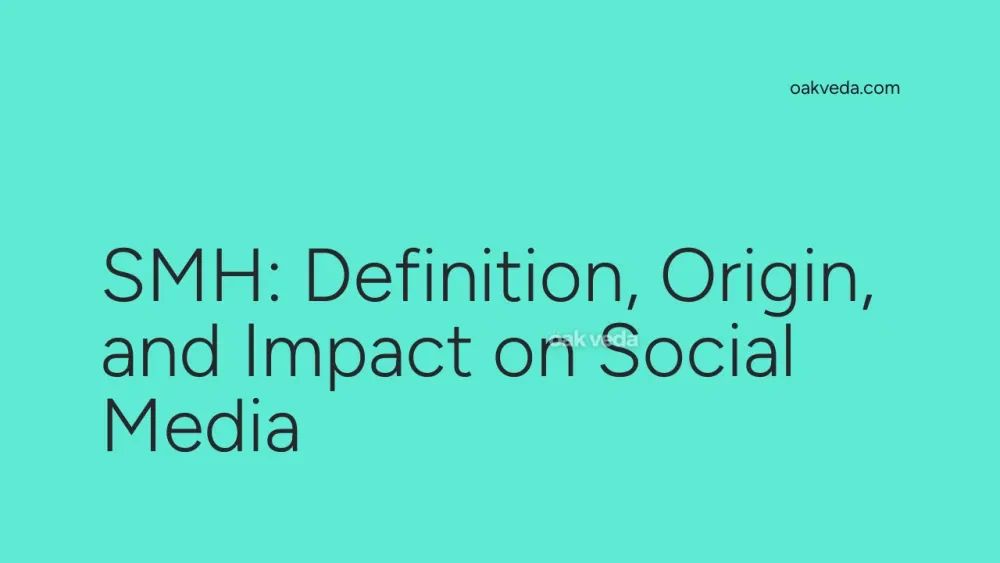
What is SMH?
SMH is an acronym that stands for "Shaking My Head." It's a widely used internet slang expression that conveys disappointment, disbelief, or frustration. In digital communication, SMH serves as a quick way to express disapproval or exasperation without using many words.
Origin and Development of SMH
The exact origin of SMH is difficult to pinpoint, but it gained popularity in the early 2000s with the rise of text messaging and online forums. As social media platforms like MySpace and later Facebook emerged, SMH became more widespread. Its usage peaked in the 2010s and continues to be a staple in online conversations today.
How SMH Works
SMH is typically used in response to something the user finds foolish, annoying, or disappointing. It can be used:
- As a standalone response
- At the beginning or end of a sentence
- In combination with other internet slang or emojis
For example:
- "Did you see that politician's tweet? SMH."
- "SMH at people who don't use turn signals."
- "That movie was terrible... SMH 🤦♀️"
Types or Variations of SMH
While SMH is the most common form, several variations exist:
- SMDH: Shaking My Damn Head (more emphatic)
- SMFH: Shaking My F***ing Head (stronger, more vulgar)
- SMGH: Shaking My God Head (less common, used for extreme disbelief)
Popular Examples of SMH
SMH has been used countless times on social media platforms. Some notable examples include:
- Celebrities using SMH in tweets to express disappointment in media coverage
- Sports fans reacting to controversial referee decisions
- Political commentators responding to policy announcements
Impact of SMH on Social Media Culture
SMH has significantly impacted social media culture in several ways:
- Brevity in communication: It allows users to express complex emotions quickly.
- Tone setting: SMH often sets a disapproving or sarcastic tone in conversations.
- Meme culture: The term has been incorporated into numerous memes and reaction GIFs.
- Cross-platform usage: SMH is recognized across various social media platforms, creating a universal language.
Controversies or Debates Surrounding SMH
While SMH is generally accepted, it has faced some criticism:
- Generational divide: Older users may find it confusing or unprofessional.
- Overuse: Some argue that SMH has become cliché due to excessive use.
- Tone misinterpretation: In text-based communication, SMH can sometimes be misunderstood as more aggressive than intended.
How Brands and Influencers Use SMH
Brands and influencers have incorporated SMH into their social media strategies:
- Relatable content: Using SMH to connect with younger audiences
- Humor: Incorporating SMH into jokes or memes for engagement
- Commentary: Providing opinions on industry trends or competitor actions
- Customer service: Acknowledging customer frustrations in a relatable way
Example: "We know waiting in line sucks. SMH at long queues. That's why we've added more staff!"
Future Trends Related to SMH
As social media evolves, so does the usage of internet slang like SMH:
- Visual representation: Increased use of GIFs and emojis to accompany or replace SMH
- Voice and video content: Adaptation of SMH into spoken content on platforms like TikTok
- AI and chatbots: Integration of internet slang like SMH into AI-driven communication for more natural interactions
- New variations: Emergence of new, related expressions as language continues to evolve online
FAQs about SMH
-
Is SMH considered rude? While not inherently rude, SMH can be perceived as dismissive or judgmental depending on the context.
-
Can SMH be used professionally? It's generally best to avoid using SMH in professional settings, as it may be seen as too casual or unprofessional.
-
How do you pronounce SMH? SMH is typically not pronounced as a word. Instead, people say the individual letters "S-M-H" or the full phrase "shaking my head."
-
Is SMH only used in English? While originating in English, SMH has been adopted by internet users in many non-English speaking countries.
-
Are there cultural differences in using SMH? Yes, the frequency and acceptability of using SMH can vary between different online communities and cultures.
In conclusion, SMH has become a significant part of online communication, allowing users to express complex emotions succinctly. As social media continues to evolve, SMH and similar expressions will likely adapt, reflecting the ever-changing landscape of digital communication. Understanding these terms is crucial for effective online interaction and staying current with internet culture.
You may be interested in:
- Stock Photos: Definition, Origin, and Impact on Social Media
- Marketing Funnel: Definition, Origin, and Impact
- Access Group: Definition, Origin, and Impact on Social Media
- Creator Economy: Definition, Origin, and Impact
- Fire: Definition, Origin, and Impact in Social Media
- Social Media Monitoring: Definition, Origin, and Impact

